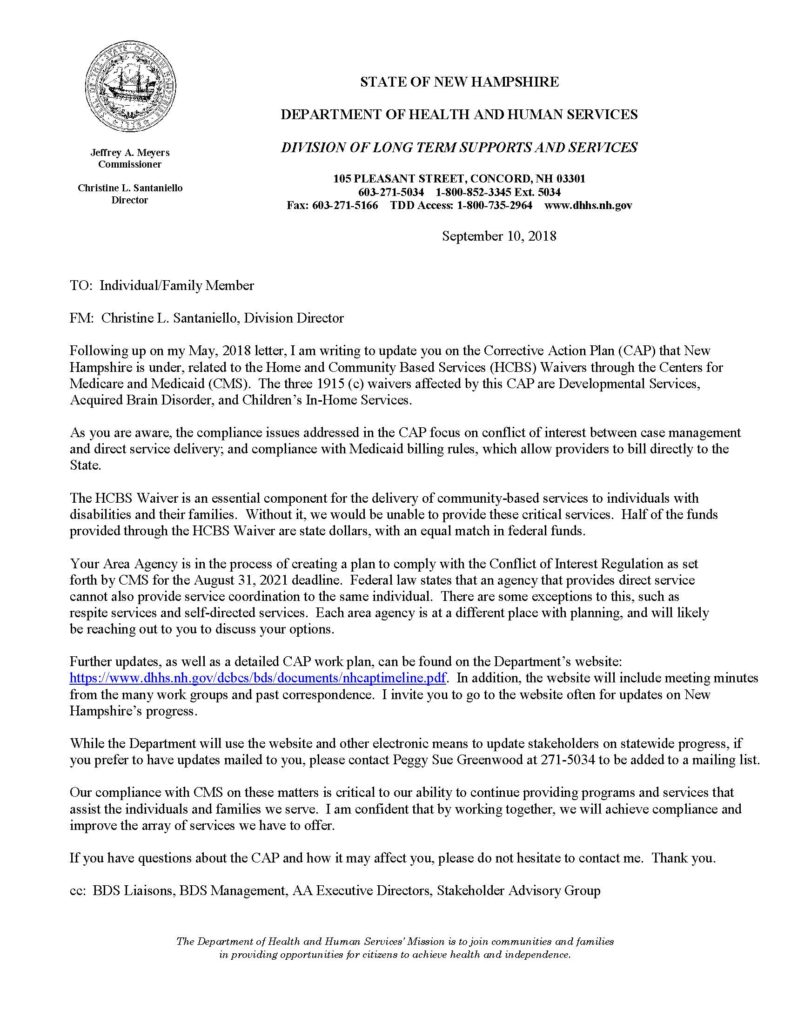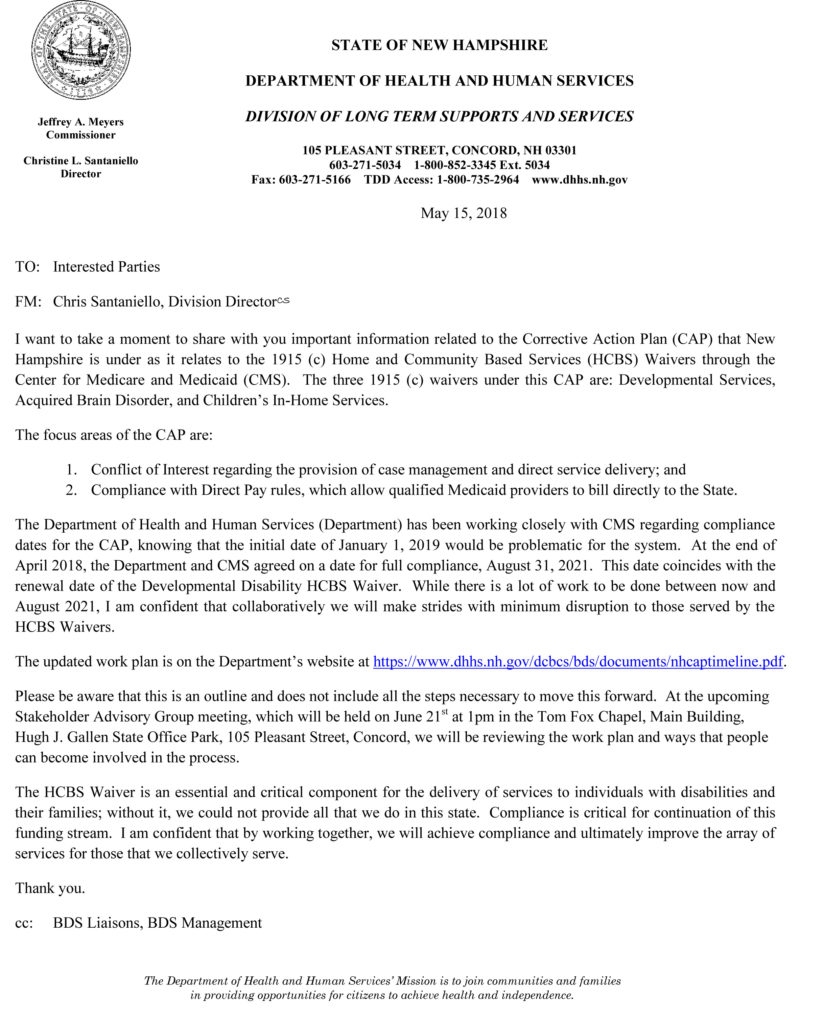
Lakes Region Community Services (LRCS) Stakeholders: Conflict Free Case Management
I am writing to inform you about impending compliance issues that impact our service delivery model as an Area Agency.
Background Information
LRCS is reimbursed for In Home Supports (IHS), Developmental Disabilities (DD) and Acquired Brain Disorder (ABD) Services through Medicaid funding. Services are billed to New Hampshire’s Home and Community Based Services (HCBS) Waivers for these categories.
These waivers are granted and administered by the Centers for Medicare & Medicaid Services (CMS), a federal program. The New Hampshire Department of Health and Human Services (DHHS) must reapply with CMS for renewal every five years. The renewal process is driven by the Bureau of Developmental Services (BDS.)
The Issue
Why are we talking about this? In the waiver renewal process this year, all three waivers have come under questioning from CMS for a couple of compliance issues. One of the issues in particular, Conflict of Interest, has the most significant impact for our families.
Per CMS: States are required to separate case management from service delivery functions. In accordance with 42 CFR 442.301 (c)(1)(vi), New Hampshire (NH) must ensure that it’s service delivery system is conflict-free. Specifically, this means that:
(vi) Providers of Home and Community Based Services (HCBS) for the individual, or those who have an interest in or are employed by a provider of HCBS services, must not provide case management or develop the person-centered service plan, except when the State demonstrates that the only willing and qualified entity to provide case management and/or develop person-centered service plans in a geographic area also provides HCBS. In these cases, the State must devise conflict of interest protections including separation of entity and provider functions within provider entities, which must be approved by CMS. Individuals must be provided with a clear and accessible alternative dispute resolution process.
Plainly stated, BDS is telling LRCS that per interpretation of the CMS rule, we can no longer provide case management (resource coordination) along with residential and community participation services. We cannot be a case manager and a provider and be considered compliant with the CMS regulations. BDS was approved to file a corrective action plan to bring the NH waivers into compliance by July 2018-filing now moved to January, 2019. In a short time we are being asked to restructure LRCS as we know it, to comply with the CMS regulations, otherwise NH risks losing its waivers and the ability to be reimbursed by Medicaid for the critical services we provide.
Action Plan
So where do we go from here? The Board and Leadership of LRCS is committed to working through this issue with the dedication and due diligence that has allowed us to be the strong, private non-profit social services agency that provides not only key services in the areas of IHS, DD and ABD, but in total family support, Autism services, educational services and meeting needs found in service gaps for the communities we serve.
This means that while we will participate in work groups on this issue organized by DHHS and BDS; and Community Support Network Inc. (CSNI), (the not-for-profit organization that works in support of the 10 Area Agencies throughout the state of NH), we will also develop our own action plans, through a variety of focused efforts. While we understand the BDS position of direct compliance with the CMS rule, we also respect the history of a system that was developed from a grass roots commitment to local solutions for a population that deserves our utmost care and attention.
We believe that there is always room for improvement and are dedicated to moving forward, however this mandate does not “feel” like a step forward. Instead it presents as a bureaucratically driven distraction from the 45+ years of proud progress in NH’s system. To that end we also intend to bring families and politicians together to participate in a solution that advocates for the NH way.
Next Steps:
- DHHS has developed a workgroup with a limited number of stakeholder representatives that have been chosen, however the meetings held by this group are public meetings. LRCS is not represented (there are representatives from other Area Agencies) but we will send people to attend. We will also post the meeting times and places on Facebook and our web page, as anyone is free to attend.
- LRCS has formed a local workgroup comprised of LRCS Executive Management, Board Members, Family Support Council, community, family and individual representatives. If you are interested in participating in this workgroup please e-mail Rebecca.Bryant@lrcs.org
Please check back here regularly for updates and important information.
More information can also be found on the State of New Hampshire, Bureau of Developmental Services website.
Update 5/20/2019 Press release from Governor Sununu regarding Conflict Free Case Management


Update 9/24/2018
Update 5/15/2018
Compliance Date for Corrective Action Plan extended to August 31, 2021

A PDF link to this memo can be found here.
Update 11/14/2017
Dear LRCS Individuals, Families, Board of Directors and Staff,
I am writing to update you on the current state of the Corrective Action Plan (CAP) regarding Conflict in Case Management (Conflict.)
Since our initial communications and forums to solicit your feedback, and the sign-up of participants to our local stakeholder group, I am happy to report that the process of implementing the impending changes to the LRCS structure or service delivery model has slowed down. Thus the need to pull the local stakeholder volunteers together for a planning meeting is less urgent.
When the Conflict issue was presented by the Bureau of Developmental Services (BDS) last fall and the State signed on to the CAP, LRCS needed to act swiftly to inform all of our stakeholders to make sure the voices of those we serve were heard loud and clear at the onset of any change to our system. We have accomplished that. It was also key that the LRCS voice be heard at the state level through the Statewide Stakeholders group, and we have done that.
The LRCS Board is now working on an overall statement to inform policy makers at the federal and state level that neither NH, nor LRCS, plan to accept what would be the largest systematic change to our system since the closure of the Laconia State School, without assuring that the change improves our system and increases personal choice rather than harming it and reducing choice.
My day-to-day work regarding Conflict has been at the State level, working with BDS and CSNI- the association of the Area Agencies (AA). By mid-summer we reached an understanding that we needed to all work together – individual AA’s, CSNI and BDS – to slow down the CAP and delay implementation. So far those efforts have been successful. BDS was able to get CMS to agree to a delay until January, 2019 (from July, 2018 deadline.) We will continue to push for delays to ensure that your needs and your voice are considered in any change, so we don’t face a federal regulation that lacks local consideration.
I will continue to share information as it becomes available and place updates on the LRCS Website – Stakeholders page. I am always willing to answer a phone call or e-mail or have coffee and explain to anyone who is interested where this process stands. At this point however, the local stakeholders group does not need to gather, but please stay tuned, as that can always change.
Thank you for your willingness to serve and for staying informed!
Becky
Rebecca L. Bryant, President & CEO
Update 10/27/2017
This letter from the bureau regarding listening sessions went out out via US mail. A PDF version of this letter can be found here. More information can be found at the State of NH CAP website.
Updated 10/23/2017
Important information on upcoming forums being held by NH Family Voices. We encourage all families to participate.
A PDF of this document can also be downloaded here.
Updated 9/26/2017
Presentation Slides Available
On Wednesday, September 20th Matthew Ertas, former BDS Director, presented at LRCS on Conflict Free Case Management in response to the pending Corrective Action Plan.
If you were unable to attend, you will find a pdf of Matthew’s slides containing thoughtful and important information at the link below.
Updated 6/13/2017:
This is a reminder that the first Corrective Action Plan (CAP) Stakeholder Advisory Group took place on June 21st from 1-3 in the Tom Fox Chapel in the Main Building at the Department of Health of Health Services – Bureau of Developmental Services, 105 Pleasant Street, Concord, NH.
This is a required component to New Hampshire’s provision of Home and Community-Based Services (HCBS) under the 1915 (c) waivers for Individuals with Developmental Disabilities, Individuals with Acquired Brain Disorders, and Children’s In-Home Support Services.
The Center for Medicaid and Medicare (CMS) is requiring New Hampshire to make changes in two areas of the service delivery system:
- Conflict of Interest in Case Management to be in compliance with the Home and Community Based Setting (HCBS) regulations requiring the separation of case management and direct service delivery; and
- New Hampshire’s Organized Health Care Delivery System, relating to the payment process for providers.
New Hampshire’s Corrective Action Plan was approved by CMS on April 21, 2017. This will serve as a framework for the process that New Hampshire will undertake to reach compliance with CMS’ standards. It is not a commitment to an identified, specific model for delivery of services; instead, it is a roadmap that New Hampshire will follow to develop a structure that meets federal requirements. On the BDS’ website; you can expect to find a copy of the approved CAP at https://www.dhhs.nh.gov/dcbcs/bds/documents/nhcapcmsapproved.pdf as well as all other documents related to the CAP.
While the requirement to separate case management and direct service delivery may cause changes in how services are provided at the local level, it is the intent and commitment of all involved to ensure the focus remains on the individual and family served as we comply with the federal requirements. All CAP Stakeholder Advisory Group meetings are open to the public and the materials will be posted on BDS’ website.
Thank you.
Kaarla Weston, MHSA
NH Department of Health and Human Services
Bureau of Developmental Services
Current Documentation:
Letter to Stakeholders on Conflict in Case Management
Corrective Action Plan for Waivers

